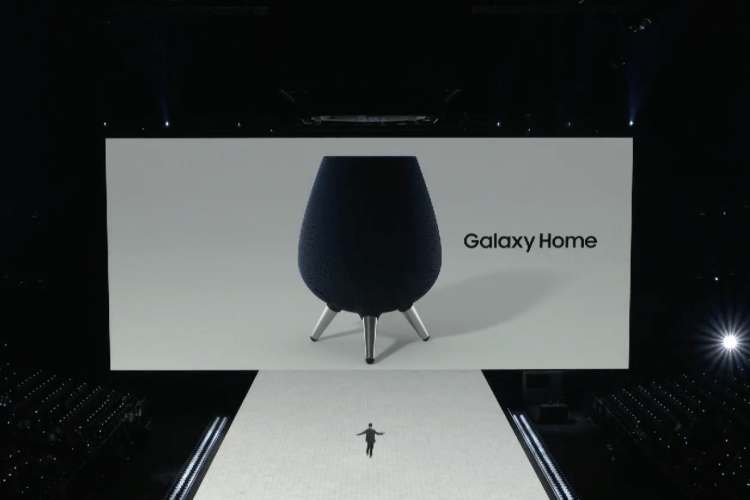Watch all the Transform 2020 sessions on-demand here.
Amazon has Echo smart speakers, Google has Home speakers, Apple has the HomePod, and today, after more than a year of speculation and anticipation, Samsung introduced Galaxy Home, the first smart speaker with its AI assistant Bixby.
The speaker made its debut today alongside the Galaxy Watch and Samsung Galaxy Note9, which comes with a 6.4-inch display, a camera that can tell you when someone is blinking during a photo, and an S-pen stylus that can be used as a remote control for presentations and as a camera trigger.
No sale date or price was shared for the Galaxy Home today. Previous reports from anonymous sources put the cost at $300.
Additional details about the speaker will be shared at the Samsung Developer Conference scheduled to take place November 7 and 8 in San Francisco, said Samsung VP of AI strategy Ji Soo Yi onstage today at the Barclay Center in Brooklyn.
June 5th: The AI Audit in NYC
Join us next week in NYC to engage with top executive leaders, delving into strategies for auditing AI models to ensure fairness, optimal performance, and ethical compliance across diverse organizations. Secure your attendance for this exclusive invite-only event.
Galaxy Home comes with functionality now considered standard issue for smart speakers, such as the ability to play music or control smart home devices without the need to lift a finger.
Spotify was announced as the Galaxy Home’s go-to-market music partner, to allow users to quickly switch music between your smartphone and your television and a Galaxy Home or receive Spotify music recommendations through Bixby.
Since Bixby was first made available in 2017 in the S8 smartphone, it has often been talked about as less capable than assistants like Alexa, Siri, Google Assistant, and Cortana, but the arrival of the Galaxy Home could shake up the smart speaker market.
Though Samsung is introducing its smart speaker years after companies like Amazon, as tech giants continue to encourage consumers to shift their behavior and speak with AI assistants in more places, Samsung’s foothold in households may help.
A survey of consumers earlier this year found that smart home appliances affect purchasing decisions for smart speakers, and appliances they own can influence which assistant they choose to use.
A price as high as $300 may mean less adoption from consumers, however, since price is still the most important factor for smart speaker shoppers. For context, the Google Home runs for $129 and the second-generation Amazon Echo for $99.

Like the $329 HomePod, to justify a higher price, the Galaxy Home markets itself as a high-end speaker, with AKG speakers and a subwoofer for deep bass. Sitting atop three legs, the speaker is built for omnidirectional sound, but utilizes Harman tech to recognize your location. Galaxy Home also comes with an array of eight microphones for far-field voice recognition so the speaker can hear the “Hi Bixby” wake word from a distance.
Since Bixby is just two years old, the AI assistant lacks many of the features rivals like Google and Amazon have brought to their assistants, like being able to schedule your appointments on your behalf, but it’s unclear how much this matters to the average person.
Voice apps continue to garner little usage, while top voice assistant use cases continue to be around things like checking the weather, playing music or videos, and, yes, controlling smart home devices.
That could be part of the reason why Samsung placed Bixby inside smart televisions and Family Hub refrigerators before releasing a smart speaker.
Samsung’s new smart speaker may become central to a series of sweeping promises made by Samsung executives in the past year, including ambitions to bring Bixby and machine learning-driven insights to every one of its products in the years ahead and make SmartThings your IoT remote control.
One major area where Bixby can make up ground: understanding new languages. Bixby-enabled products are available in 200 markets around the world today but can only communicate in Korean and English.
Amazon today announced plans to sell Spanish-speaking smart speakers in Mexico, signaling an expansion into Spanish-speaking countries shortly after becoming available in France. Alexa now speaks six languages, while Google Assistant is expected to speak more than 30 languages and be able to operate in multilingual households by the end of the year.
Samsung has certainly continued to signal the importance of AI and conversational AI to its product line with the hire of prominent Bell Labs researchers, plans to hire 1,000 AI researchers by 2020, and new AI labs in Canada, Russia, and the United Kingdom. Earlier this week, Samsung’s electronics division committed $22 billion in research investment in AI, 5G, IoT, and other emerging fields.


